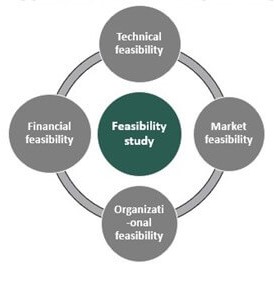Feasibility analysis is the process of evaluating a business idea to determine whether it is practical and likely to succeed.
The primary objective of Feasibility Study is to uncover strength and weakness of a business idea.
It helps entrepreneurs identify potential risks and assess whether their concept can be turned into a viable business.
The four main areas of feasibility analysis are:

- Industry/target market feasibility:
This looks at whether the industry and target market are growing, if there is demand for the product/service, and how the market can be penetrated effectively. -
Product/service feasibility:
This assesses whether the product or service meets customer needs, is technically feasible, and offers a competitive advantage in the market. -
Financial feasibility:
This evaluates the financial aspects of the business, including initial costs, funding requirements, and the potential for profitability. It helps determine if the business can sustain itself financially and grow. -
Organizational feasibility:
This assesses whether the business has the right structure, resources, and capabilities to operate successfully. It includes evaluating the management team, operational processes, and infrastructure needs.